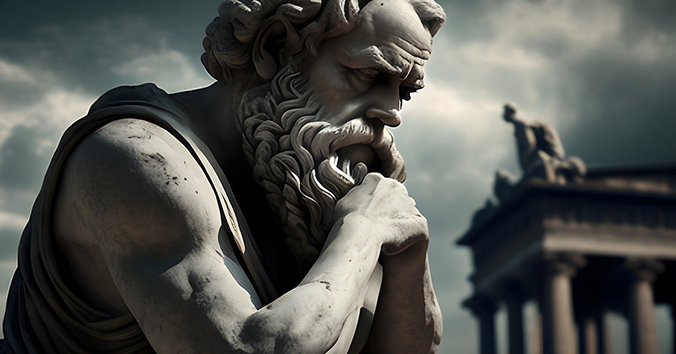Philosophy begins with doubt, this has been emphasized by many philosophers. But what does it mean to doubt? To harbor suspicions? To criticize accepted beliefs? In that case, doubt is based on thinking we know better. We believe that we have good reason to doubt.
Is that doubting? Thinking that you know? It sounds paradoxical, but it is probably the most common form of doubt. We doubt, and think we can easily explain why. But this is hardly the doubt of philosophy. For in that case philosophy would not begin with doubt, but with belief or knowledge. If a philosopher doubts, and easily motivates the doubt, the philosopher will soon doubt her own motive for doubting. To doubt, as a philosopher doubts, is to doubt one’s own thought. It is to admit: I don’t know.
Perhaps I have already quoted Socrates’ famous self-description too many times, but there is a treasure buried in these simple words:
“when I don’t know things, I don’t think that I do either.”
The oracle at Delphi had said of Socrates that he was the wisest of all. Since Socrates did not consider himself more knowledgeable than others, he found the statement puzzling. What could the oracle mean? The self-description above was Socrates’ solution to the riddle. If I am wiser than others, he thought, then my wisdom cannot consist in knowing more than others, because I do not. But I have a peculiar trait, and that is that when I do not know, I do not think I know either. Everyone I question here in Athens, on the other hand, seems to have the default attitude that they know, even when I can demonstrate that they do not. Whatever I ask them, they think they know the answer! I am not like that. If I do not know, I do not react as if I knew either. Perhaps this was what the oracle meant by my superior wisdom?
So, what did Socrates’ wisdom consist in? In beginning with doubt. But must he not have had reason to doubt? Surely, he must have known something, some intuition at least, which gave him reason to doubt! Curiously, Socrates seems to have doubted without good reason. He said that he heard an inner voice urging him to stop and be silent, just as he was about to speak verbosely as if he knew something: Socrates’ demon. But how could an “inner voice” make Socrates wise? Is that not rather a sure sign of madness?
I do not think we should make too much of the fact that Socrates chose to describe the situation in terms of an inner voice. The important thing is that he does not react, when he does not know. Imagine someone who has become clearly aware of her own reflex to get angry. The moment she notices that she is about to get angry, she becomes completely calm instead. The drama is over before it begins. Likewise, Socrates became completely calm the moment he noted his own reflex to start talking as if he knew something. He was clearly aware of his own knowledge reflex.
What is the knowledge reflex? We have already felt its activity in the post. It struck us when we thought we knew that a wise person cannot doubt without reason. It almost drove us mad! If Socrates doubted, he must have had good reason! If an “inner voice” inspired doubt, it would not be wisdom, but a sure sign of madness! This is the knowledge reflex. To suddenly not be able to stop talking, as if we had particularly good reason to assert ourselves. Socrates never reacted that way. In those situations, he noted the knowledge reflex and immediately became perfectly calm.
The value of becoming completely calm just when the knowledge reflex wants to set us in motion is that it makes us free to examine ourselves. If we let the knowledge reflex drive our doubts – “this is highly dubious, because…” – we would not question ourselves, but assert ourselves. We would doubt the way we humans generally doubt, because we think we have reason to doubt. Of course, Socrates does not doubt arbitrarily, like a madman, but the source of his doubt becomes apparent only in retrospect. Philosophy is love for the clarity we lack when philosophizing begins. Without this loving attitude towards what we do not know, our collective human knowledge risks becoming a colossus on clay feet – is it already wobbly?
When the knowledge reflex no longer controls us, but is numbed by philosophical self-doubt, we are free to think independently and clearly. Therefore, philosophy begins with doubt and not with belief or knowledge.

Written by…
Pär Segerdahl, Associate Professor at the Centre for Research Ethics & Bioethics and editor of the Ethics Blog.
Plato. “The Apology of Socrates.” In The Last Days of Socrates, translated by Christopher Rowe, 32-62. Penguin Books, 2010.
Thinking about thinking



Please!
I can know that I don’t know something.
Where’s the doubt?
I can also know that what I think I know may be wrong.
But I may act on it faute de mieux.
What role does doubt play then?
My apologies for going on!
Philosophy is not a love of clarity, as you say.
That’s only 20th century philosophy desperately trying to carve out a role for philosophy in the face of science and technology’s onslaught.
Check the etymology: a love of wisdom as total knowledge.
A pursuit of knowledge that promises survival and flourishing.
Philosophy has only one job: to tell us how to live.
It’s authority?
Synoptic vision enfolding all the arts and sciences and technologies and anything else that we can think up……